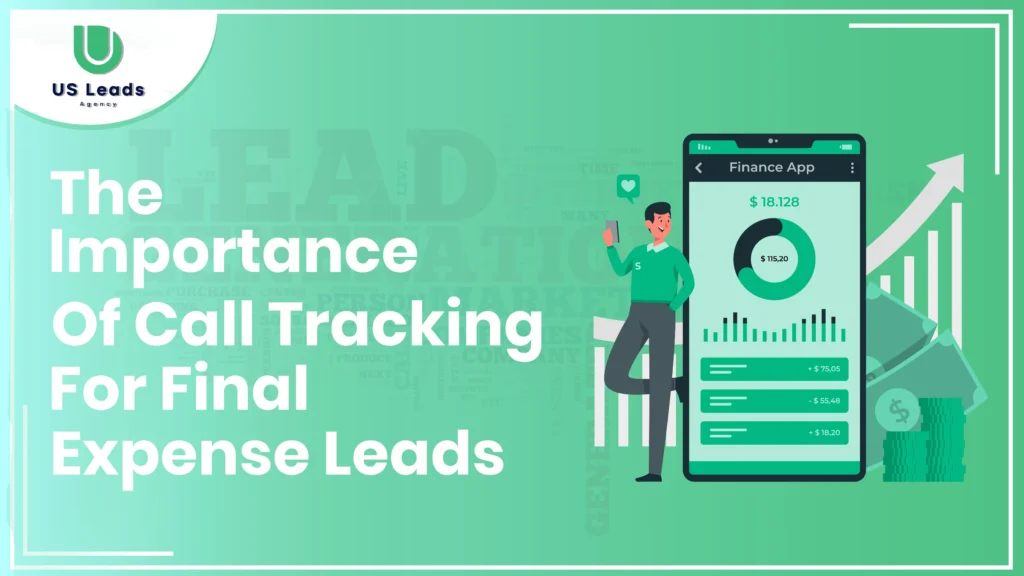
In the competitive world of final expense insurance, where every lead counts, call tracking has become a game-changer. This technology allows agents and agencies to gain valuable insights into customer behavior, optimize marketing campaigns, and close deals more efficiently.
This article delves into the role of call tracking in final expense lead generation, its key benefits, and the features essential for maximizing its potential.
Key Takeaways:
- Enhanced Attribution: Understand which campaigns generate high-quality final expense leads.
- Better Customer Insights: Analyze call data to improve engagement strategies.
- Lead Quality Monitoring: Focus resources on high-intent leads.
- Compliance Assurance: Use call recordings to meet industry regulations.
- Critical Features: Look for tools like dynamic number insertion, CRM integration, and analytics.
Table of Contents
What Are Final Expense Leads?
Final Expense Leads are potential customers interested in final expense insurance, a life insurance policy designed to cover end-of-life costs like funeral expenses and burial services.
Key Characteristics:
- Target Audience: Typically seniors aged 50–85.
- Affordability: Seek budget-friendly, small-coverage policies.
- Family-Oriented: Aim to relieve their family of financial burdens.
Role Of Call Tracking In Final Expense Lead Generation:
1. Enhanced Marketing Attribution:
Final expense leads come from multiple channels, such as Facebook ads, direct mail, and telesales. Call tracking assigns unique phone numbers to campaigns, helping identify which channels drive the best results. This data ensures efficient budget allocation and maximizes ROI.
2. Improved Customer Insights:
Call tracking captures details like call times, durations, and customer questions. These insights help tailor conversations and marketing efforts, ensuring a personalized approach that resonates with prospects.
3. Increased Lead Quality Monitoring:
By analyzing call recordings and metrics, agents can evaluate lead quality. This ensures the sales team focuses on high-intent prospects, improving efficiency and conversion rates.
4. Better Lead Nurturing:
Trust and personalization are essential in final expense insurance. Call tracking enables agents to monitor the customer journey, ensuring timely follow-ups with relevant information. This proactive approach strengthens relationships and increases sales.
5. Compliance and Record-Keeping:
The insurance industry has strict regulatory requirements. Call tracking systems often include call recording, ensuring agents adhere to sales scripts and compliance guidelines. Recorded calls can also resolve disputes and verify agent performance.
6. Real-Time Performance Monitoring:
For managers, call tracking provides insights into agent performance. By reviewing metrics like call duration and outcomes, managers can identify areas for improvement and offer targeted training to boost effectiveness.
Features To Look For In A Call Tracking System:
To fully leverage the benefits of call tracking, ensure your system includes the following features:
- Dynamic Number Insertion (DNI): Automatically assigns unique numbers to campaigns for accurate tracking.
- Call Analytics: Generates detailed reports on call performance, including volume and outcomes.
- CRM Integration: Syncs with customer relationship management tools to streamline lead tracking.
- Call Recording: Provides a reliable reference for quality assurance and compliance.
- Geographical Tracking: Identifies caller locations to target specific regions effectively.
Conclusion – Role Of Call Tracking In Final Expense Lead Generation:
Call tracking is a strategic necessity for final expense insurance agents aiming to optimize their lead generation and conversion efforts. By providing actionable insights into marketing effectiveness, customer behavior, and compliance, call tracking empowers agents to make data-driven decisions and achieve better results.
If you’re not already using call tracking for your final expense lead generation strategy, now is the time to start. With the right tools and features, you can gain a competitive edge, improve efficiency, and unlock new growth opportunities.
FAQs:
What features should I look for in a call tracking system?
Dynamic number insertion, call analytics, CRM integration, call recording, and geographical tracking are essential.
How does call tracking impact lead quality?
It allows agents to assess and prioritize high-intent leads, saving time and resources.
